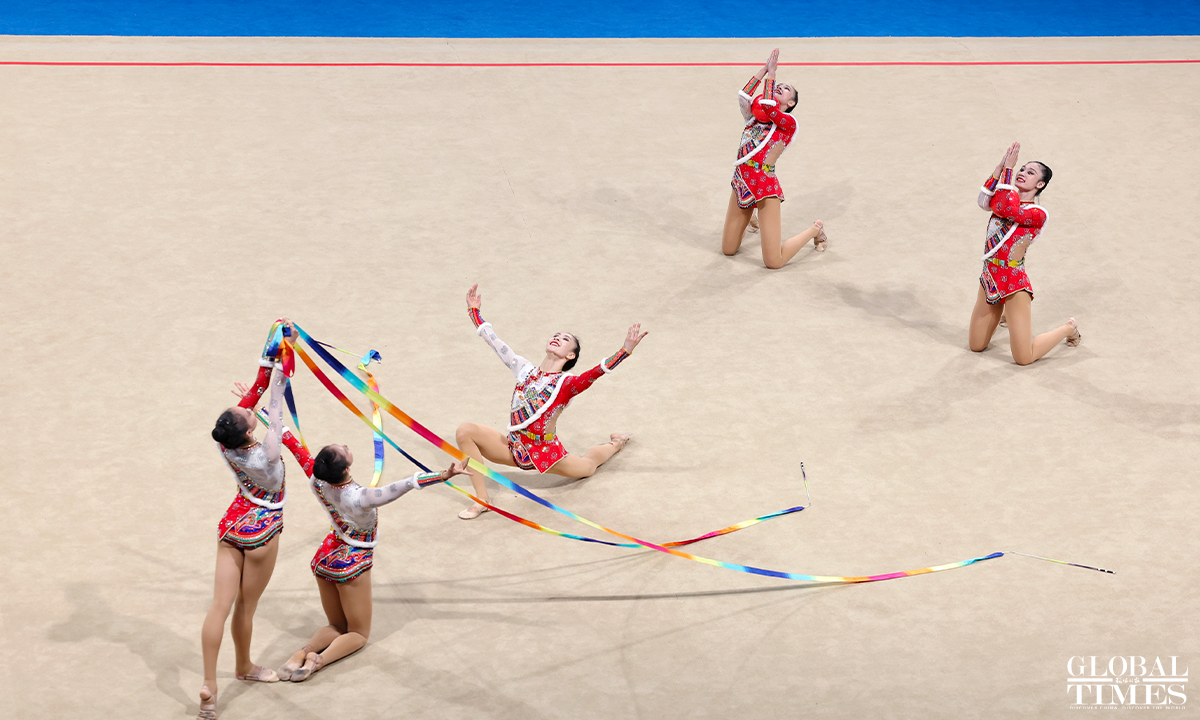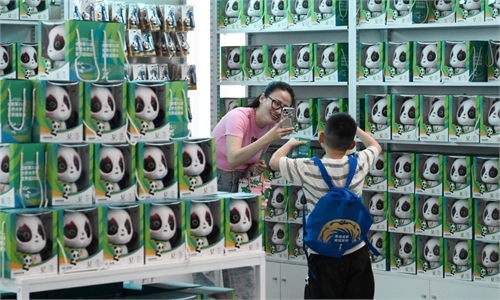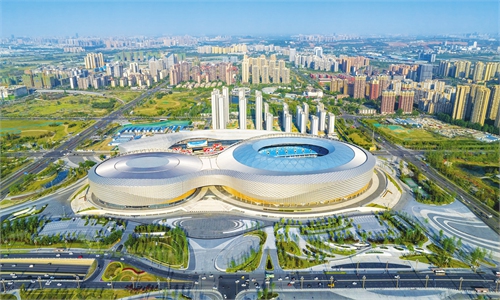ARTS / CULTURE & LEISURE
Gymnastics glory with folk music
Team proud to compete alongside traditional elements

Photo: Cui Meng/GT
The Chinese team has performed well in the rhythmic gymnastics competition, putting on a good show with traditional folk songs and customs, as enthusiastic spectators in Chengdu, capital of Southwest China's Sichuan Province, reacted with jubilation as Team China bagged two golds and one silver medal in the three-day competition.
The team, performing to the music of famous folk song "Kangding Love Song," from the city of Kangding in Sichuan Province, received a protracted ovation inside the Chengdu Sport University Gymnasium, as they scored 57.175 points to win the team all-around final on Sunday.
The gold medal is the first for China in the team all-around rhythmic gymnastics at a FISU Games.
In the team five hoops competition, they scored 30.900 points to win the gold medal, while a 0.15-point gap left them with a silver medal in the team three-ribbon-and-two-ball event on Monday.
Wearing red and white outfits that integrate Tibetan ethnic elements that horse riders in Kangding use, the Chinese athletes, all from Chengdu Sport University, have been the main attraction for spectators, though technically they were outperformed twice by their Japanese counterpart quintet in the three-ribbon-and-two-ball.
"Our outfits were specially designed to integrate Tibetan features. The costume we wear is for another program which is characterized by its variability," Chinese team captain Xiao Mingxin told reporters.
"The coach told us that when listening to 'Kangding Love Song,' we should imagine that we're riding a horse across a huge grassland," Xiao told the Global Times.
"But the result means we still have room for improvement."
Coach Ren Shuang noted that incorporating traditional Chinese cultural elements made the team proud to represent China at the Universiade.
"We incorporated many traditional Chinese musical instruments such as the erhu and suona among many others as well as numerous ethnic dance elements," Ren told reporters.
"Our performance here not only aims to represent the city Chengdu but also the country."
Ren said that competing at their home stadium of Chengdu Sport University Gymnasium helped the team to cope with the pressure.
"The applause from the Chinese audiences filled the stadium, which gave the gymnasts a big morale boost," Ren said. "I'm very proud they are competing with confidence."
Xiao also credited the choreography, which benefitted from the guidance of ethnic dance teachers.
"I think our advantage is that we have invited ethnic dancing teachers to fine-tune our actions," Xiao told reporters, adding the team will continue to integrate traditional cultural elements into their future performances.
Chinese team player Li Huilin was close to a medal finish in the individual hoop competition, but finished fourth in the eight-gymnast event.
"I was very nervous in the beginning, until the coach told me to relax and enjoy the moment," Li told reporters.
"It's a pity I failed to make into the final round, but that's the glamor of sports: you have to perform at your best level if you want to succeed on the court."
Zhao Yue, another Chinese competitor who finished seventh in the clubs event, said she has left many wonderful memories on the stage.
"The audience in Chengdu was very enthusiastic, which made me feel excited to give my best performance on the stage," Zhao told the Global Times. "I'm reluctant to leave because there are so many wonderful memories here."
Fanni Pigniczki of Hungary and Ukraine's Khrystyna Pohranychna are the other big winners in rhythmic gymnastics, as the duo both bagged two individual gold medals.
"I felt the superb energy from the audience. The atmosphere here is great. The audience is amazing. I really enjoyed being on the carpet," Pigniczki told reporters.
"The Games means a lot to me, because I have never won this kind of medal in such a big competition."
The Hungarian also added that she plans to see the pandas as well as scenic spots of Chengdu, which is also a hot tourist destination in China.



